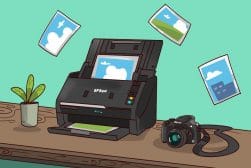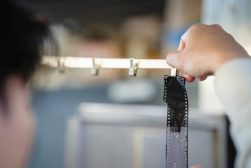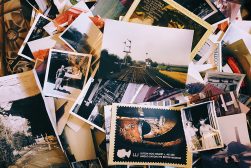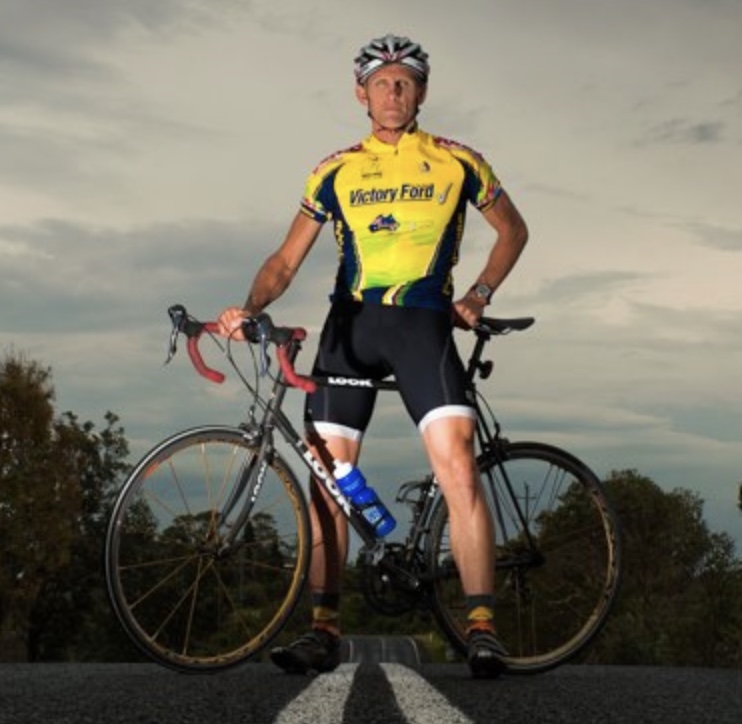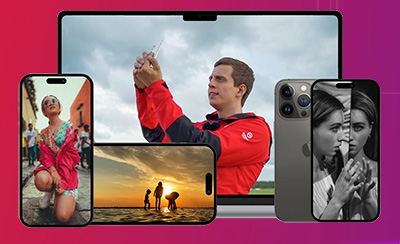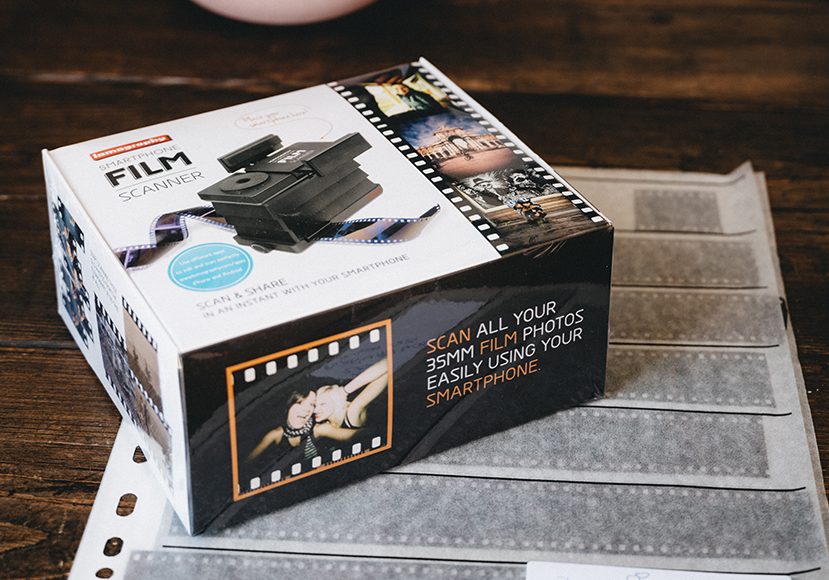
8 Best Film Scanners Worth Using in 2023
Digitizing your old prints, negatives and slides is an important process for preserving all your favorite memories. Here are the best film scanners to do it.
Accessory Guides | Camera Gear Guides | By Jeff Collier | Last Updated: August 22, 2023
All the best film scanners and slide scanners we tested on this list make it easy for you to digitize your old 35mm negatives, slides and even cine film.
Whether you’ve just discovered analog photography and want to scan film negatives, or you’ve got boxes of old slides you want to bring back to life, a film scanner will help you convert everything to digital.
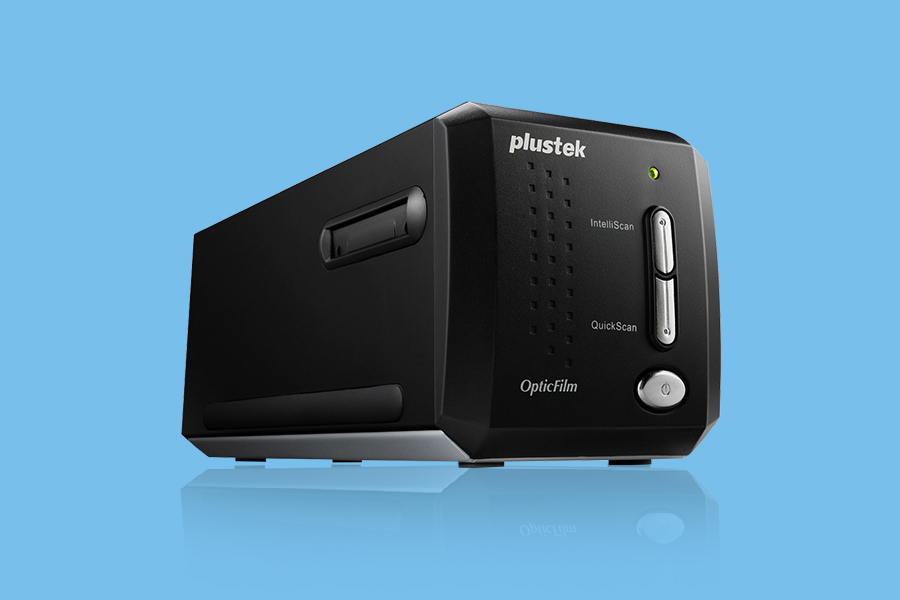
Fast, high quality and simple to use way to scan color and mono negatives, as well as 35mm slide positives.
(This is different from our article on the best photo scanners, which recommends products for scanning actual physical photographs as opposed to film.)
You can get decent results from a regular flatbed scanner when used in conjunction with a film holder, and there are even some film scanning apps for smartphones.
However, a dedicated flatbed film scanner offers the best results, squeezing out every last detail from your print scans, allowing you to enhance and restore old photos during digital post-production.
So if you’d prefer to have a go at your home instead of using an online photo scanning service, here are our recommended products for getting the job done yourself.
Table of Contents
What is the Best Film Scanner to Buy in 2023?
| Image | Product | Features | |
|---|---|---|---|
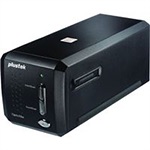 | Plustek 8200iOUR #1 CHOICE |
| View Price → |
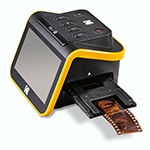 | Kodak Slide N ScanTOP RATED |
| View Price → |
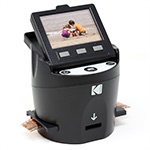 | Kodak ScanzaEASY TO USE |
| View Price → |
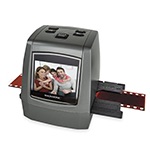 | Magnasonic All-In-OneGREAT VALUE |
| View Price → |
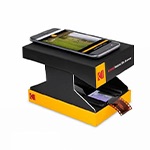 | Kodak Mobile Film ScannerBEST BUDGET |
| View Price → |
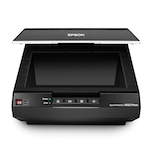 | Epson Perfection V600POPULAR CHOICE |
| View Price → |
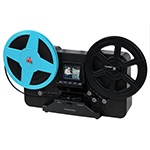 | Magnatonic Super 8/8mm Film ScannerHIGHLY RECOMMENDED |
| View Price → |
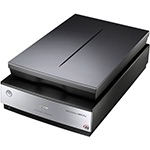 | Epson Perfection V850 Pro scannerBEST FOR BUSINESS |
| View Price → |
Plustek 8200i | Best 35mm film scanner

- Automatically removes dust and scratches
- SilverFast scanning software
- 7,200 DPI
- Scans 35mm color and mono negatives, as well as 35mm slide positives
- High price point
- Max resolution scanning takes time
We can’t put together slide scanner reviews without mentioning at least one 35mm film scanner from Plustek.
The Plustek 8200i remains one of the better film scanners available to both amateur and professional film photographers alike. Scan quality stands at 7,200 DPI, which is respectable for something in this price range.
You still need a computer to work the Plustek 8200i. The SilverFast scanning software works between the computer and film scanner to produce high-quality scans of various negatives and slides.
Thankfully, when we tested the Plustek, connecting it up to a computer and using the software was an easy process and one that even elderly folk could manage.
You can quickly scan both color and mono 35mm film on the Plustek 8200i. You can also scan 35mm slide positives as well, making it a really useful product for digitizing all your film memories.
The infrared scanning channel on this film scanner helps to produce quality scans. Plus, the software works to remove dust and scratches automatically.
Unlike other scanners, the Plustek 8200i won’t save your photos. Scanning slides at maximum resolution can take a while as well.
However, it’s still our pick of the best negative scanner of the year at this price.
Kodak Slide N Scan
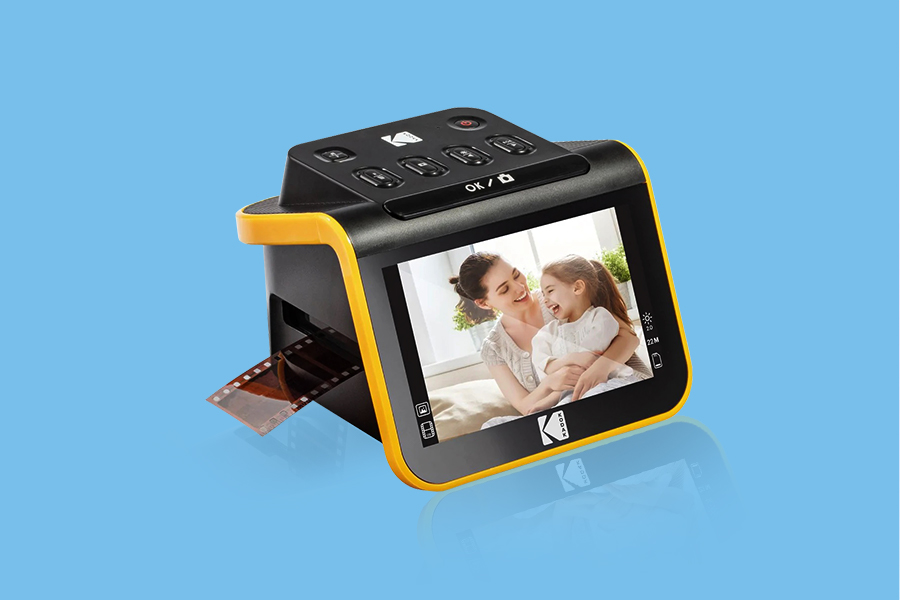
- No software required
- 5-inch screen
- Continuos film scanning
- Scans 110, 126, and 135 films
- Requires SD card
- Not the best for professional scanning results
Kodak makes scanning images easy with the Kodak Slide N Scan. As one of the more prominent slide scanners on the market, it’s a no-brainer for transferring old photos to digital format.
(Even though the name mentioned ‘Slide,’ this product isn’t actually a 35mm slide scanner – it scans negative strips, not individual slides.)
The Kodak Slide N Scan works with an SD card that can hold up to 32GB. It also comes with a USB and HDMI cable to hook up to your computer or TV.
The 5-inch LCD screen helps you to preview images as well as fine-tune them. You can even use the screen as an electronic picture frame if you’d like.
While this Kodak scanner is limited to certain sizes, they include 50mm slides, along with 110, 126, and 135mm films. You can also continuously load the film to speed up scanning.
During our tests, scan quality wasn’t the absolute best on this film scanner, but it does make it easy to transfer photos to digital format.
Kodak Scanza

- Portable
- LCD screen tilts
- Large buttons for navigation
- Supports a variety of film formats
- Scan quality is not the best
- Basic functions
If you just want to try your hand at scanning film, you should check out the Kodak Scanza. This product supports 35mm film, as well as 110, 126, and Super 8/8mm negatives and slides.
The Kodak features a tilting LCD screen, from which you can operate your film scanner. This particular model features large buttons that help you move between photos with ease.
The one-step Scan and Save feature makes it easy to scan old reels and slides. You can even customize the images to make them your own.
Kodak allows you to save your scanned photos to an SD card. You can also share them via USB and HDMI cables to your computer and TV.
Professional photographers might find the scanning results of this product lackluster when compared to others.
However, when it comes to amateur photography, Kodak Scanza can help you digitize your film and slides to share for years to come.
It’s our pick as the best film and slide scanner at this affordable price point.
Magnasonic All-In-One
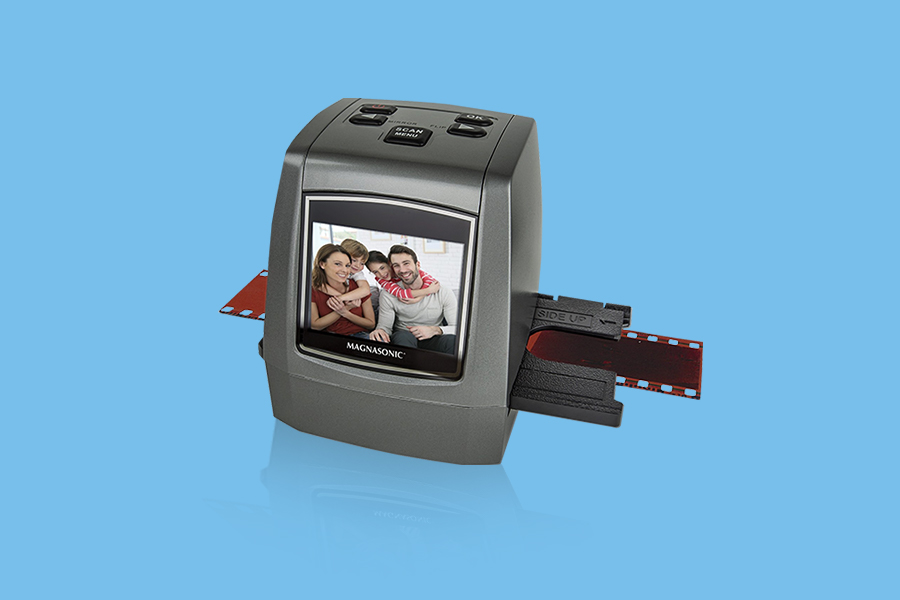
- Scans film quickly
- 128MB internal memory
- No software required
- Affordable negative film scanner
- No batch scanning feature
- Limited resolution
Marketed as an all-in-one scanner, Magnasonic All-In-One features the ability to preview your photo before you scan it. This can be incredibly helpful for adjusting your settings to produce the best scan possible.
You also won’t need any type of software to make the Magnasonic work. Scanned images can be saved to the SD card or they can be stored within the internal memory.
The SD card saves film up to 128GB, while the internal storage is limited to 128MB. Plus, the screen makes it easy to interact with the scanner before and after you scan.
The Magnasonic All-In-One supports 35mm film, as well s 110, 126, and Super 8. This scanner produces scans of 3,200 DPI in quick fashion.
As a versatile scanning platform, this scanner includes many a feature to make it worthwhile.
Kodak Mobile Film Scanner
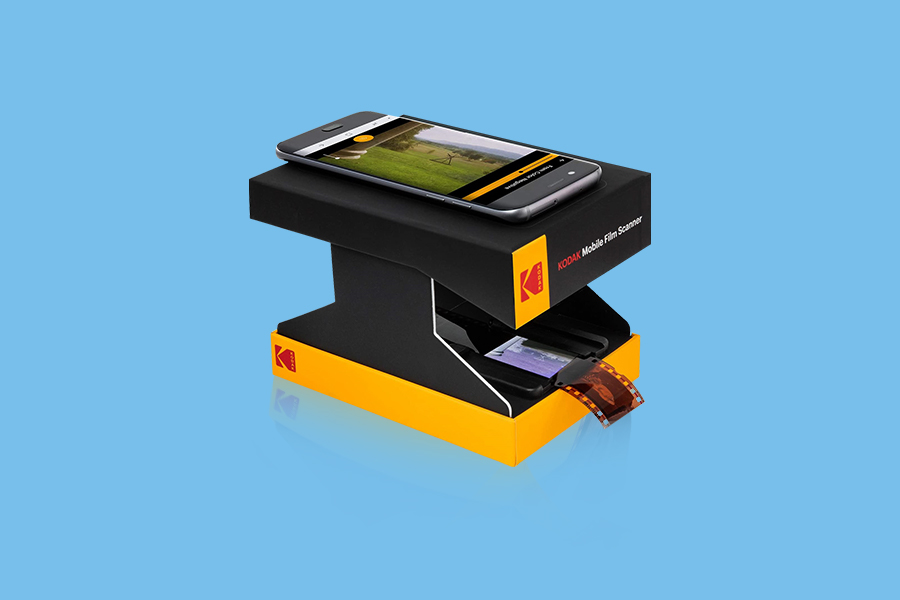
- Collapsible
- Entry-level pricing
- Versatile application
- Incorporated light source
- May not fit all phones
- Relies on smartphone camera quality
You might have wanted to take pictures of your old photos with your smartphone camera, and the Kodak Mobile Film Scanner makes this a simple reality.
Resting your iPhone or Android smartphone on the box, you can easily take scans of your favorite pictures to convert them to digital format.
This scanner is collapsible so easy to travel with. It’s also really affordable. The converter uses a cardboard box and light to produce quality scans you can feature in any picture frame.
Kodak’s mobile scanner supports 35mm film and negatives. You simply hook it up to your phone and start taking pictures to save your best pictures.
Obviously, you are relying on how good your phone’s image quality is, so the better the camera phone, the better the end results. You’ll also need good lighting in the room – we recommend natural window light, or use the scanner outside on a sunny day.
Epson Perfection V600
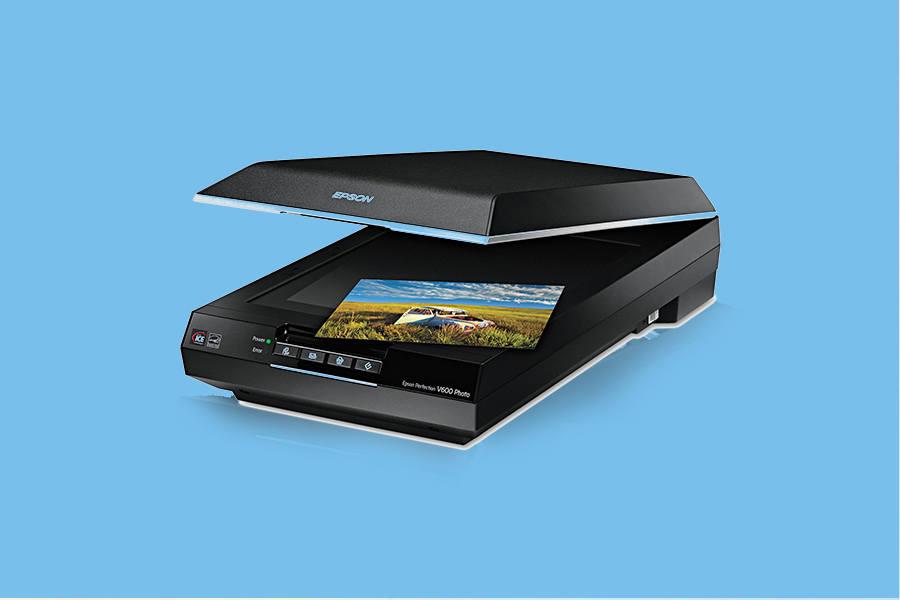
- 12,800 DPI resolution
- Medium format support
- versatile flatbed scanner
- Multi-frame scanning
- Better detail from other scanners
- Can be expensive
This flatbed scanner from Epson features a slew of scanning abilities that will earn the space it takes up on your desk. Plus, it’s a quality flatbed scanner you can use for other applications as well.
The Epson Perfection V600 is capable of scanning up to 12,800 DPI, which is one of the top scanning resolutions on the market. In fact, this flatbed scanner will scan a frame at 3,200 DPI within a minute.
Though it requires a computer to function, the Epson Perfection V600 also includes support for medium format film. It will also go through and scan each frame individually to get the best results.
In addition to supporting medium format, this flatbed scanner also supports 35mm film in mono and color, as well as 35mm slide positives. The 120/220 medium format isn’t something a lot of other scanners can attest to.
The Epson scanner provides automatic multi-frame scanning with superior results. You can also take advantage of the Digital ICE automatic dust and scratch removal features to produce better film scans across the board.
While it’s true that you’ll get more detail out of other scanners, including those on our list, this Epson flatbed scanner does put up a good fight. It’s a good all-around film scanner to have at your side when you need it.
Magnasonic Super 8/8mm Film Scanner
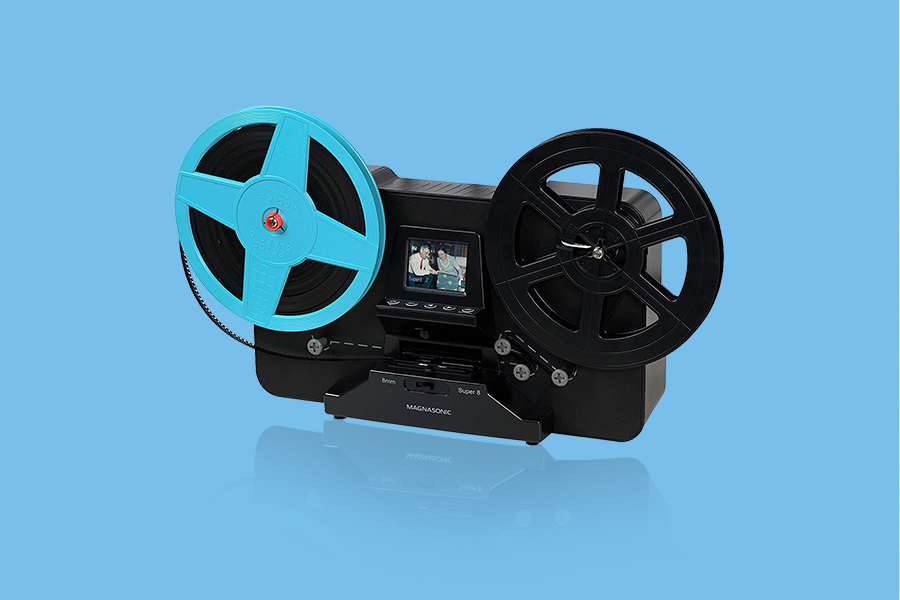
- Supports 3, 5, and 7-inch film reels
- No computer or editing software required
- 1080p video resolution
- Saves up to 120 hours of video
- Small screen
- No film holders included
Who needs a video camera when you have the Magnasonic Super 8/8mm scanner? You can save up to 120 hours of video on a 32GB SD card with this versatile scanner that doubles as an old-fashioned 8mm camcorder of sorts.
Plus, the video resolution is 1080p, which is still industry standard (there’s no need for 4K in this instance). You can also adjust a number of features on your scans, from resolution and sharpness to framing and exposure.
This scanner will scan 50 feet of film in around 30 minutes, making it an efficient solution to taking pictures of each film yourself. You can even use the RCA cable to connect to your TV.
The Magnasonic Super 8 scanner supports 3-inch, 5-inch, and 7-inch film reels. You don’t need a computer or editing software either, making this a useful stand-alone product to scan your film.
Epson Perfection V850 Pro scanner
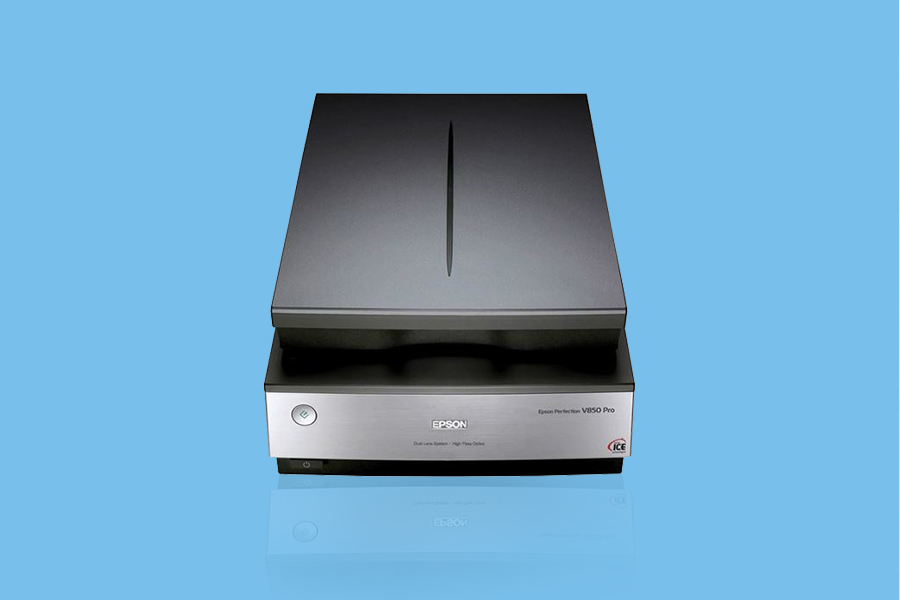
- Two sets of film holders
- 12,800 DPI capable
- Tons of features
- 120/220 medium format
- Requires computer
- Some compare the quality to the more affordable Epson V600 model
This top-of-the-line film scanner comes with two film holders ready for scanning. While these two film holders can help with 35mm film and slide positives, they can also be useful for the 120/220 medium format film as well.
This Epson scanner will require a computer. However, it does offer 12,800 DPI scanning capabilities that help to produce a better scan overall.
If you’re looking for a quality scanner for your 35mm film, you should definitely check out the Epson Perfection V850 Pro.
It’s definitely an investment, but if you’re serious about getting the best image quality out of your old film photos, it’s worth the money.
Is it Worth Buying a Film Scanner?
Purchasing a film scanner can accomplish a few goals, though there are some downsides to this type of product. For instance, you’ll need to invest in the film scanner up-front, so cost is a factor.
At the same time, purchasing your own film scanner can help you save money. Rather than paying for your scanned images to go through a third-party service, you have total control over your materials.
Depending on the film scanner you choose, you can also pick from various software programs to manipulate your photos and film. Plus, you can keep track of your film and keep it safe from harm or damage.
Film scanners are also easier to use than flatbed scanners in some ways, especially when it comes to scanning film. You will need to invest in a separate device to hold your film down if the scanner you purchased doesn’t come with one.
With that said, film scanners can be expensive. They can cost much more than a few trips to your local photography shop.
These film scanners can also take up a lot of space, depending on which model you choose. And in some ways, a professional photo lab can be more time efficient and offer better end results.
Can you scan film on any scanner?
Theoretically, you can scan film on any scanner. However, the quality of the results will depend on how well the film is backlit.
Backlighting helps to ensure higher resolutions for more vibrant photos. At the same time, you can also use silver cardstock to achieve the same effect.
Depending on the film scanner, you may be able to manipulate the image quality and edit the film. Adjusting the white balance can help as well.
What kind of scanner do you need to scan film?
If you want to scan film, you’ll need a film negative scanner. This scanner is also called a transparency or slide scanner as well.
The best film scanners use a focused beam of light to capture each photo. In some cases, a built-in motor can move through the negatives automatically to create an image.
Negatives and slides that go through a negative scanner produce good image quality. These scanners are also affordable and easy to use.
For Smartphones: What is the Best Slide Scanner App?
Google PhotoScan is a great app for both Android and iOS users. This free slide scanning app takes a total of 5 images per single image to assemble a final photo that’s free of glaring light sources and shadows.
Photomyne is also another film scanning app you can download on both smartphone platforms. This app includes both free and paid features and links to other Photomyne apps that help you create new memories with prints.
Adobe Scan helps preserve your precious memories with its scanning app, which uses Adobe Sensei to perfect your image quality. The app is free to download but you’ll need an Adobe log-in to access all features.
How to Choose the Best Film Scanners
1. Type of scanner
Flatbed scanners are the most common and affordable type of film scanner. However, they can be slow to scan and produce lower resolutions than other types of scanners.
A dedicated film scanner requires a computer to complete the scanning process. You’ll achieve a higher quality scan with more detail, but that comes with a bigger price tag.
All-in-one film scanners fall between flatbed scanners and dedicated film scanners in terms of price. At the same time, the scan quality of these film scanners isn’t the best.
2. Resolution
You will want to purchase a film scanner with at least 3,000 DPI to achieve a high-quality image. The resolution relies on pixels to produce excellent results.
In most cases, you’ll be paying more for resolution than any other features of the scanner. Two scanners might be priced similarly, but if one offers a better resolution than the other, chances are it will be a better scanner overall.
3. Dynamic range
A film scanner’s dynamic range is the product’s ability to achieve optical density. Dynamic range is measured from 0 to 4, with 4 being the best.
The best film scanners feature a dynamic range between 3 and 4. The higher the range on the slide digitizer, the more vibrant your photo.
4. Software
Digital photos require software in order to turn physical photographic materials into images in digital format. This software might only allow you to manipulate your photos during the scanning process, or it can give you the option of editing and storing them as well.
The best film scanner comes with intuitive software that makes processes easy and simple. This includes a screen within the film scanner or a way to connect to a computer or TV.
5. Ease of use
The best film scanner is easy to use and produces high scan quality results. Some might include premium features, but those should be easy to use as well so you can start scanning immediately.
An easy-to-use film scanner should be as simple as it is capable. Advanced features shouldn’t include a steep learning curve, if any.
- How to convert slides to digital files
You can feed the slides into a scanner, and it’ll automatically convert the images into digital formats, like JPEG.
Alternatively, you can get a slide duplicator attachment for a DSLR camera. The duplicator will position the slide in front of the lens so you can take the picture, which will then be saved as a digital file in the camera’s memory.
Choosing a Flatbed Scanner for Film | Final Words
Scanning your own film can be fun with the best slide and negative scanner. We certainly had a lot of fun testing the products in this list.
It may be a little fiddly to set things up initially, but the satisfaction of making your analog memories into digitals is hard to put in words!
We hope you’ve found this article on the best slide scanners in 2023 will help you make the memories of your past come back to life.

Fast, high quality and simple to use way to scan color and mono negatives, as well as 35mm slide positives.





